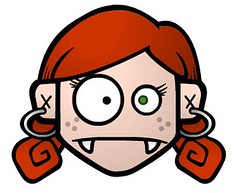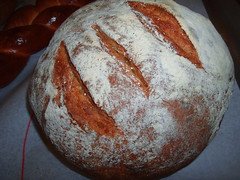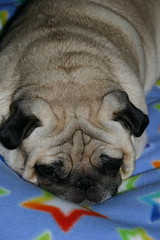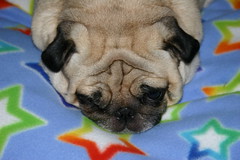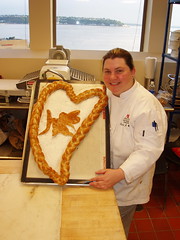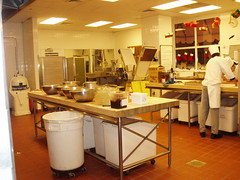Word of the Day for Wednesday June 29, 2005
lineament \LIN-ee-uh-muhnt\, noun:
1. One of the outlines, exterior features, or distinctive
marks of a body or figure, particularly of the face.
2. A distinguishing or characteristic feature; -- usually in
the plural.
If she saw herself, even in her memory, she did not see the
brightness that had been hers as a wife; she saw the lined
and ageing woman she had become, as if these lineaments had
been waiting to emerge since her features had first been
formed.
--Anita Brookner, [1]Visitors
Biography -- and, by definition, autobiography -- is the
form of the moment. In the shape of a well-lived, well-told
life we can discern the lineaments of the day and even, if
the life to hand signifies more than itself, the age.
--Fred Inglis, "No Discouragement: An Autobiography,"
[2]New Statesman, December 6, 1996
Crazy wooden galleries common to the backs of half a dozen
houses, with holes from which to look upon the slime
beneath; windows, broken and patched, with poles thrust
out, on which to dry the linen that is never there; rooms
so small, so filthy, so confined, that the air would seem
too tainted even for the dirt and squalor which they
shelter; wooden chambers thrusting themselves out above the
mud, and threatening to fall into it--as some have done;
dirt-besmeared walls and decaying foundations; every
repulsive lineament of poverty, every loathsome indication
of filth, rot, and garbage; all these ornament the banks of
Folly Ditch.
--Charles Dickens, [3]Oliver Twist
_________________________________________________________
Lineament comes from Latin lineamentum, "feature, lineament,"
from linea, "line."
Wednesday, June 29, 2005
Tuesday, June 28, 2005
Word of the Day for Tuesday June 28, 2005
woebegone \WOE-bee-gon\, adjective:
1. Beset or overwhelmed with woe; immersed in grief or sorrow;
woeful.
2. Being in a sorry condition; dismal-looking; dilapidated;
run-down.
Socrates, condemned to death by the people of Athens,
prepares to drink a cup of hemlock, surrounded by woebegone
friends.
--Alain De Botton, [1]The Consolations of Philosophy
This woebegone lot includes Henry, a real-estate developer
whose dream project has, like his marriage, slipped into
bankruptcy; Henry's sister, Wiloma, who has hurled herself
headlong into the arms of a New Age church to survive her
own divorce; and Henry and Wiloma's decrepit Uncle Brendan,
a former monk whose faith has eroded along with his health,
stranding him in a nursing home.
--Jennifer Howard, review of [2]The Forms of Water, by
Andrea Barrett, [3]New York Times, June 13, 1993
After 40 years as a producer he thinks of himself as a
battered, scarred but well-armoured animal, "like an old
turtle"; and if such creatures could speak they would
probably sound like [him], a bit woebegone but drolly
unsurprised by life's vicissitudes.
--"Time for another Hugo hit," [4]Times (London), May 22,
2000
_________________________________________________________
Woebegone is from Middle English wo begon, from wo (from Old
English wa, used to express grief) + begon, past participle of
begon, "to go about, to beset," from Old English began, bigan,
from bi-, "around, about" + gan, "to go."
1. Beset or overwhelmed with woe; immersed in grief or sorrow;
woeful.
2. Being in a sorry condition; dismal-looking; dilapidated;
run-down.
Socrates, condemned to death by the people of Athens,
prepares to drink a cup of hemlock, surrounded by woebegone
friends.
--Alain De Botton, [1]The Consolations of Philosophy
This woebegone lot includes Henry, a real-estate developer
whose dream project has, like his marriage, slipped into
bankruptcy; Henry's sister, Wiloma, who has hurled herself
headlong into the arms of a New Age church to survive her
own divorce; and Henry and Wiloma's decrepit Uncle Brendan,
a former monk whose faith has eroded along with his health,
stranding him in a nursing home.
--Jennifer Howard, review of [2]The Forms of Water, by
Andrea Barrett, [3]New York Times, June 13, 1993
After 40 years as a producer he thinks of himself as a
battered, scarred but well-armoured animal, "like an old
turtle"; and if such creatures could speak they would
probably sound like [him], a bit woebegone but drolly
unsurprised by life's vicissitudes.
--"Time for another Hugo hit," [4]Times (London), May 22,
2000
_________________________________________________________
Woebegone is from Middle English wo begon, from wo (from Old
English wa, used to express grief) + begon, past participle of
begon, "to go about, to beset," from Old English began, bigan,
from bi-, "around, about" + gan, "to go."
Monday, June 27, 2005
Word of the Day for Monday June 27, 2005
callow \KAL-oh\, adjective:
Immature; lacking adult perception, experience, or judgment.
Those who in later years did me harm I describe as I knew
them then, and I beg any reader to remember that, although
I was hardly callow, I was not yet wise in the ways of the
world.
--Iain Pears, [1]An Instance of the Fingerpost
George Black Jr was grateful that during his protracted
courtship of Betty, his future father-in-law 'bore my
callow unsophistication with benign indulgence'.
--Richard Siklos, [2]Shades of Black
They watched in awe as Revere, at first a callow and
unambitious youth, began to develop into a serious young
man dedicated to books and devoted to his father.
--Sherwin B. Nuland, "The Saint," [3]New Republic, December
13, 1999
Callow is from Old English calu, "featherless, bald."
Immature; lacking adult perception, experience, or judgment.
Those who in later years did me harm I describe as I knew
them then, and I beg any reader to remember that, although
I was hardly callow, I was not yet wise in the ways of the
world.
--Iain Pears, [1]An Instance of the Fingerpost
George Black Jr was grateful that during his protracted
courtship of Betty, his future father-in-law 'bore my
callow unsophistication with benign indulgence'.
--Richard Siklos, [2]Shades of Black
They watched in awe as Revere, at first a callow and
unambitious youth, began to develop into a serious young
man dedicated to books and devoted to his father.
--Sherwin B. Nuland, "The Saint," [3]New Republic, December
13, 1999
Callow is from Old English calu, "featherless, bald."
Maui at Sunset!
This photograph was taken after a rain storm and I really liked the gray sky over the blue water. They blend together, but have a different texture and look. The ocean and the sky in Maui at Sunset!
Cocoa the Pug Close Up
This is a photograph of Cocoa my youngest Dog before bed on her favorite blanket.
Heart and Cupid Bread Showpiece
I liked this Photo, since the view of the water is in the background. I worked really hard on this showpiece,especially on the very long braid that frames the piece.
The Kitchen at the Swan Hotel Disney World Orlando!
When visiting my Brother Bill last Christmas we went to the Swan Hotel at Walt Disney World for Sunday Brunch. I went into the kitchen, since I met a Chef that works there when I was at the World Pastry Forum in 2004. He had the day off, but I looked around and watched them prepare massive amounts of desserts for New Years Eve.
My Brother Bill and Mickey Mouse!
I found this photo of my brother when browsing through the four thousand photographs (literally) that I have take in the last four years. It was taken at Bill's Condo in Orlando, Florida near Walt Disney World.
Sunday, June 26, 2005
Word of the Day for Sunday June 26, 2005
amative \AM-uh-tiv\, adjective:
Pertaining to or disposed to love, especially sexual love;
full of love; amorous.
Theoretically, any given left-kisser should meet more
right-kissers and, over an amative lifetime, or even good
year in junior high, be subtly pressured to shift to the
right in order to land a wet one -- or just avoid a broken
nose. No?
--Donald G. McNeil, Jr., "Pucker Up, Sweetie, and Tilt
Right," [1]New York Times, February 13, 2003
In the spring a young man's fancy turns to thoughts of
another nap even more often than it does to amative
imaginings, Tennyson to the contrary notwithstanding.
--"Touch of Spring Fever Makes Whole World Kin," [2]Science
News, May 23, 1931
Well, poetry has been erotic, or amative, or something of
that sort -- at least a vast deal of it has -- ever since
it stopped being epic.
--Helen Deutsch, "Death, desire and translation: on the
poetry of Propertius," [3]TriQuarterly, March 22, 1993
Amative comes from Medieval Latin amativus, "capable of love,"
from the past participle of Latin amare, "to love."
Pertaining to or disposed to love, especially sexual love;
full of love; amorous.
Theoretically, any given left-kisser should meet more
right-kissers and, over an amative lifetime, or even good
year in junior high, be subtly pressured to shift to the
right in order to land a wet one -- or just avoid a broken
nose. No?
--Donald G. McNeil, Jr., "Pucker Up, Sweetie, and Tilt
Right," [1]New York Times, February 13, 2003
In the spring a young man's fancy turns to thoughts of
another nap even more often than it does to amative
imaginings, Tennyson to the contrary notwithstanding.
--"Touch of Spring Fever Makes Whole World Kin," [2]Science
News, May 23, 1931
Well, poetry has been erotic, or amative, or something of
that sort -- at least a vast deal of it has -- ever since
it stopped being epic.
--Helen Deutsch, "Death, desire and translation: on the
poetry of Propertius," [3]TriQuarterly, March 22, 1993
Amative comes from Medieval Latin amativus, "capable of love,"
from the past participle of Latin amare, "to love."
Subscribe to:
Comments (Atom)

